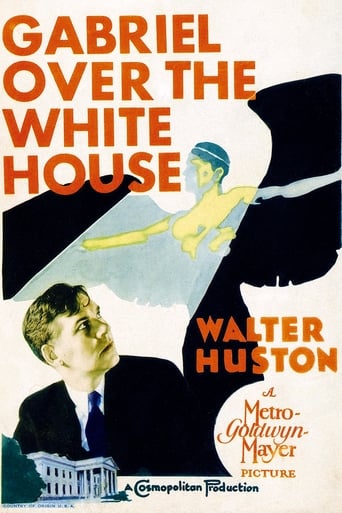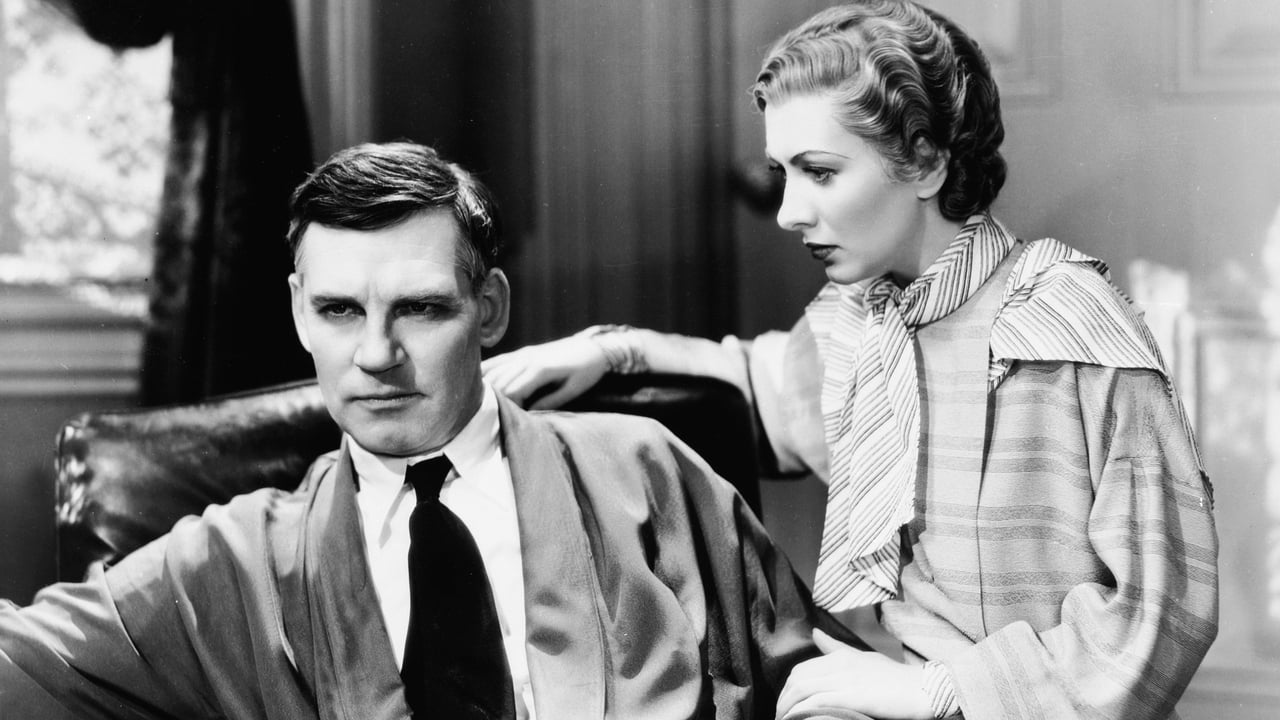Jimmy L.
GABRIEL OVER THE WHITE HOUSE (1933) is a movie that really tests the viewers' ideals about government and democracy. Is it meant to be inspirational? Aspirational? Frightening? A cautionary tale? It's certainly a movie that makes viewers think.Walter Huston plays Judd Hammond, newly elected President of the United States. The country is in the midst of an economic Depression, with millions out of work and starving, but President Hammond is happy to enjoy the comforts of his position while serving as a pawn of his political party. He has no intentions of fulfilling campaign promises or reforming the country. One character notes, "The right man in the White House can bring us out of despair, into prosperity again." It is clear that Judd Hammond is not the right man.But after a serious head injury, the President is reborn as a crusader for the greatest good. He takes action to help his suffering people, firing any cabinet members that stand in his way.The President could be suffering from some sort of brain damage, or perhaps Judd Hammond's body is being possessed by the angel Gabriel, God's messenger to the people. But, as Franchot Tone's character points out, is not Gabriel a messenger of Wrath?The new President Hammond starts as an idealistic reformer, but ultimately transforms the United States government into a Machiavellian dictatorship, complete with firing squads. Everything the President does is for the good of the people, but the ends cannot always justify the means. He supports the unemployed masses, promising to stimulate the economy and bring back prosperity. But when he meets opposition on Capitol Hill, he dissolves Congress and takes sole control of the government under martial law.To combat gangsterism, the President repeals Prohibition and establishes government-funded liquor stores. Violent resistance from the gangsters is seen as a declaration of war on the United States and a special police army is created to wipe out the racketeering scum.It's unclear how director Gregory La Cava wants the audience to feel about President Hammond. On the one hand, he is a champion of the people, fighting for the common man and getting results. But he is destroying the American democratic system in the process. Senators are outraged when the President threatens to dissolve Congress, and rightly so. Yet characters speak in great admiration of the President after he bullies the nations of the world into accepting his vision for international peace.Coming at a time when Americans looked to their leaders for help, GABRIEL OVER THE WHITE HOUSE might have been a Depression-era fantasy, giving audiences the strong political leader of their dreams. Or it might have been a caution of the slippery slope of government involvement. The film is fascinating and controversial from a modern vantage point. The economic stimulus idea has gained some relevance in recent years, though the shadows of the fascism and Nazism to come in that decade are unsettling to see (especially portrayed in the United States).
mark.waltz
As fictional President Hamilton, the brilliant Walter Huston fights fire with fire as he goes after the concerns of Americans in the depression era U.S.A. Unemployment, government corruption and racketeers are all taken on by this president, spiritually re-awakened after a car accident. Before that, he was simply another power-thirsty bureaucrat under the thumbs of a ruthless cabinet. Made a dictator through an act of congress with complete power to tackle these issues, Huston utilizes racketeer tactics to bring the real racketeers down, eventually declaring war to collect debts from the already poor European countries.Social issues which have only gotten worse are discussed with disgust as writers try to wake up audiences to the lack of true democracy in a democratic society. Elected officials are raked over the coals as are the countless millions of dollars spent on defense (or offense depending how you look at it), while the plight of the unemployed and starving is dealt with sensitively. This holds up because it is a reminded of lessons we should have learned which we seem to ignore as time goes on, still allowing men with millions (or even more) to control the world not even remotely concerned with the prosperity of the 90%. The movie is also prophetic, ironic considering the rise of tyrants in Europe on the horizon.While the screenplay is hokey in spots, for the most part, it is dead on in its idealistic views of a world in trouble that can't be improved in the normal "business as usual" tactics. Huston is ably supported by Franchot Tone, Karen Morley, Arthur Byron, Dickie Moore (as "First Nephew") and C. Henry Gordon as a bootlegging racketeer ironically named Nick Diamond. Films like this are often derided as "Capra Corn" because their creators present an idealism that is sometimes considered unrealistic and hopeless. But as long as men are able to think for themselves and not be manipulated by those who world power unwisely, that hope will always remain that a better world can be given to the people who truly matter-the ones who toil, not dominate.
Michael_Elliott
Gabriel Over the White House (1933) *** (out of 4) Political fantasy has President Judson Hammond (Walter Huston) taking office and from day one turning his back on the American people who are facing hunger due to the Depression. After an auto accident the President comes back as a new person; one that cares for the country and plans on making it better. Watching this film a couple weeks after the 2008 election makes it rather shocking at how close this movie is to current events in this country. The change that is expected in our country now that we're getting a new President is the same type of change that was needed in this film so it's rather funny that this movie plays out as a complete fantasy. William Randolph Hearst produced this film and his political side, as seen in Citizen Kane are on full display here as the message of simple and honest is smeared all over this film. This is a hard film to judge because on one level this is so over the top that you can't really take it serious. I mean, nothing that happens in this film is even possible and that includes a scene where the President wages war on a gangster. However, with that said, this movie is a fantasy, it was sold as a fantasy and if looked at as a fantasy then you have to take everything with a grain of salt. What really holds this film together is the incredible performance by Huston. The actor delivers a very strong performance, which a lot of is due to that incredible voice of his. He has to give several speeches in the film and not once does he not bring the house down. Karen Morley, Franchot Tone, Dickie Moore and Arthur Byron all deliver fine supporting performances. Again, if you go into this film taking it message too serious then you're going to be bowled over by its naive look at politics and the way to make the country better. If you look at the film as a fantasy then I think there's enough here to keep you entertained. Fans of Huston are going to enjoy it no matter what due to his great performance.
deschreiber
This is truly repulsive American jingoism. In the final scenes we see the American president, surrounded by representatives of all the other great powers of the world, give them a public tongue-lashing, into the radio microphones, no less, like a strict school-teacher scolding a bunch of children. He treats them to a display of naval air bombardment, as a warning of what to expect from the U.S. They are subdued and cowed. As the film concludes, all these world representatives are gathered indoors for a signing ceremony. They mill around, they chat, they wait until trumpets sound and someone calls, "The President of the United States!" and the president walks down a set of stairs into the room. The crowd bows to him and part the ways in silence. Gag! At the end, as the president is dying, his adoring wife tells him, "You are the greatest man who ever lived!" Yes, it is a chilling portrayal of American fascism. It is even more chilling to think that the American public would have had an appetite for this kind of unspeakable jingoism at the time. "If we only had a leader like that!" The film was release in 1933, the very year that in Der Fuerer (The Leader) was elected Chancellor.


 AD
AD




